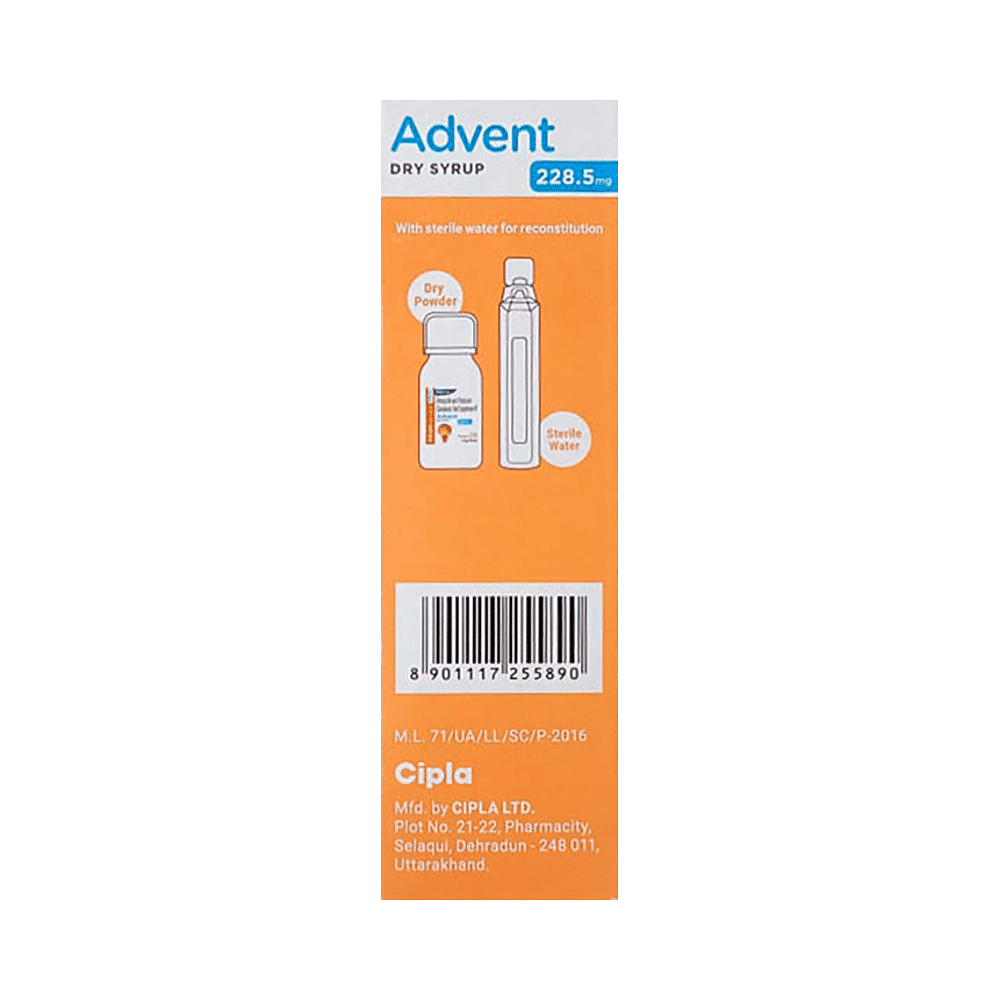
Fmx CV Dry Syrup
Manufacturer
Frank Medilink
Salt Composition
Amoxycillin (200mg/5ml) + Clavulanic Acid (28.5mg/5ml)
Key Information
Short Description
Fmx CV Dry Syrup is an antibiotic medicine that helps treat bacterial infections of the ear, nose, throat, chest, lungs, teeth, skin, and urinary tract.
Dosage Form
Dry Syrup
Introduction
Fmx CV Dry Syrup is an antibiotic medicine that helps treat bacterial infections of the ear, nose, throat, chest, lungs, teeth, skin, and urinary tract. It is capable of killing bacteria that have become resistant to other therapies and thus also helps treat tuberculosis that is resistant to other treatments.
Directions for Use
Your child must complete the entire course of antibiotics. Stopping too soon may cause the bacteria to multiply again or cause another infection.
Safety Information
Side Effects
No common side effects listed.
How it works
Fmx CV Dry Syrup is an antibiotic. It has two active agents amoxycillin and clavulanic acid. Amoxycillin works by preventing the formation of the bacterial protective covering (cell wall) essential for the survival of the bacteria. Whereas clavulanic acid serves a special purpose of inhibiting an enzyme (beta-lactamase) that is produced by resistant bacteria. This makes the combination of amoxycillin and clavulanic acid an effective line of treatment for many types of infections.
Quick Tips
Your child must complete the entire course of antibiotics. Stopping too soon may cause the bacteria to multiply again or cause another infection. Your child may have a bitter taste in the mouth after the intake of Fmx CV Dry Syrup. Eating citrus fruit or sipping plenty of water or fruit juice may help. Encourage your child to drink plenty of water in case diarrhea develops as a side effect. Never give Fmx CV Dry Syrup until and unless prescribed by the doctor. Do not give Fmx CV Dry Syrup to treat common cold and flu-like symptoms caused by viruses.
Related Medicines

Advent 228.5mg Dry Syrup Tangy Orange

Clav First Dry Syrup

Avunox CV Dry Syrup

Sunclav Dry Syrup

Claver Dry Syrup

Dolclav DS Dry Syrup

Cobex CL Dry Syrup

Moxidel CV Dry Syrup

Augliff Dry Syrup

Hexmox CV Dry Syrup
Frequently asked questions
Can other medicines be given at the same time as Fmx CV Dry Syrup?
Fmx CV Dry Syrup may interact with other medications or substances. Before starting this medication, inform your child's doctor about any other medications they are currently taking. It is also crucial to consult with your child's healthcare provider before administering any medicine to them.
Can I get my child vaccinated while on treatment with Fmx CV Dry Syrup?
Antibiotics generally do not interfere with the ingredients found in vaccines or cause adverse reactions in children who have recently been immunized. However, it is recommended to delay vaccination until your child recovers from the underlying illness before proceeding with a scheduled vaccination.
Which lab tests may my child undergo while taking Fmx CV Dry Syrup on a long-term basis?
Periodically, the doctor may monitor kidney and liver function tests during prolonged therapy to assess your child's condition.
Can I give a higher than the recommended dose of Fmx CV Dry Syrup to my child?
Giving a dosage exceeding the prescribed amount for this medicine may increase the risks associated with side effects. If your child experiences symptoms worsening, contact their doctor for a reevaluation.
Can I stop giving Fmx CV Dry Syrup to my child when the symptoms are relieved?
Do not discontinue this medication unless the complete course of treatment has been completed, even if you perceive improvement. It is possible that the symptoms may improve before the infection is completely eradicated. Therefore, continue administering the medication as prescribed for the specified duration.
Can the use of Fmx CV Dry Syrup cause diarrhea?
Yes, Fmx CV Dry Syrup can lead to diarrhea. Antibiotics often target and kill harmful bacteria. They may also disrupt the balance of good bacteria in your child's gut, contributing to diarrhea. Encourage your child to drink fluids to prevent dehydration when experiencing diarrhea. If symptoms persist or indicate signs of dehydration (e.g., less frequent urination with dark, strong-smelling urine), consult a doctor before administering any further medication.
Do all viral common colds result in secondary bacterial infection?
Viral infections are typically not followed by secondary bacterial infections. Administering antibiotics during a viral cold can increase the risk of adverse effects. It is vital to seek medical advice from your child's doctor before prescribing antibiotics.
The mucus coming out of my child’s nose is yellow-green. Is it a sign of a bacterial infection?
Yellow or green mucus in the nose does not automatically indicate a bacterial infection. During a common cold, mucus may thicken and change color from clear to yellow or green as part of the normal healing process. Most symptoms resolve within 7-10 days.
Is there any sign which shows that my child needs immediate medical attention?
It is imperative to contact your child's doctor immediately if they experience severe allergic reactions (breathing difficulties, skin rashes), gastrointestinal infections (diarrhea), or signs of liver damage (weakness, paleness, vomiting). These serious side effects are not common but require expert medical intervention.


